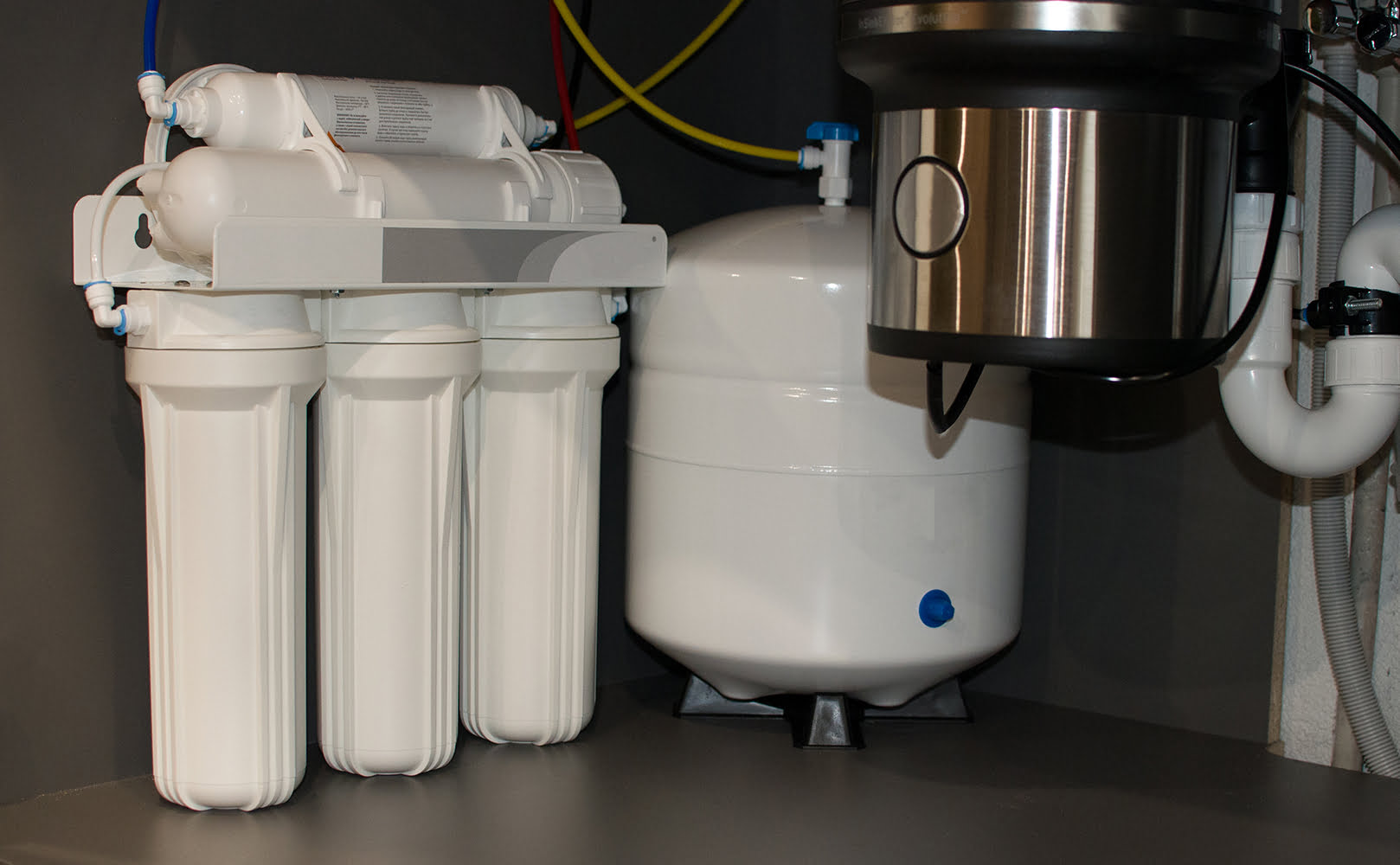RO Water Cons – Here Are the 3 Main Disadvantages
Written by: Gene Fitzgerald // Last Updated: Apr 4, 2023
This page may contain affiliate links. If you buy a product or service through such a link we earn a commission at no extra cost to you. Learn more.
As great as reverse osmosis water is, it’s not without its issues.
There are some inherent disadvantages to reverse osmosis drinking water that you should be aware of.
Let’s discuss.
Key Takeaways
RO water disadvantages are:
- The purification process wastes water.
- RO water lacks minerals.
- And RO water has slightly decreased pH.
What Are the Disadvantages of Reverse Osmosis Water?
There are relatively few disadvantages of reverse osmosis water. Most of these come down to the removal of certain elements like minerals. Some people might care more about these factors than others.
1. Con: Water Is Being Wasted
Due to the way reverse osmosis works, some water will always get wasted during the filtration process.
Modern systems have improved significantly in this regard. They often reroute wastewater back into the system to filter it again one or multiple times. This can improve the efficiency of the system and reduce the amount of wasted water.
However, you can still expect to waste at least some water for each one you’ve purified. And standard reverse osmosis systems for home use can waste as much as 4-5 gallons of water per gallon filtered.
If you want to switch to reverse osmosis water, you should specifically look for a system that uses pumps to mitigate this issue if it’s a concern to you.
2. Con: Lack of Healthy Minerals
Reverse osmosis removes pretty much all impurities from water. This includes elements which, while they can technically be considered contaminants, are actually good for your health in moderation. Mainly, various minerals. It can be hard to figure out if this has any impact on your health at all.
If your diet is rich in minerals from other sources, then this would likely not be a problem. However, it’s possible that you have unknowingly adjusted to drinking tap water and are relying on its mineral contents to some extent. In this case, you should consider taking supplements to make up for the difference if you switch to reverse osmosis water.
This is not something you should decide for yourself if you don’t have enough experience. If you’re concerned about the balance of minerals in your diet, you should always talk to your physician first.
But even in the worst case scenario, correcting the situation should be very simple with the help of readily available supplements. The only potential issue here is that you would have to limit yourself to drinking reverse osmosis water, including when you’re outside of your home, because it can be hard to know the mineral contents of other water sources.
3. Con: RO Water Has Decreased pH
Reverse osmosis water also has a lowered pH level. This is not problematic in itself, at least not for most people. However, combined with certain dietary regimes, it could be problematic. Consulting your physician is always a good idea if you’re not sure about this.
Keep in mind that the number of people who would potentially be affected by this is really small. There are no real risks associated with drinking low pH water by default. Even though water might be considered slightly acidic in those ranges, it’s still far from levels that would be harmful.
Does Reverse Osmosis Water Have Side Effects or Is Even Dangerous?
There are some myths going around about the health implications of reverse osmosis water. Some even claim that due to the low pH level of the water and its low mineral contents, it might start attacking the body. This is complete nonsense.
The only potential harm from low pH levels and low mineral levels, as we mentioned above, is related to specific dietary regimes which could be more sensitive to such changes. Other than that, there is nothing to worry about when you’re drinking reverse osmosis water. All things considered, it’s highly likely to be much healthier than your regular tap water.
How Does a Reverse Osmosis System Work?
If you’re curious how a reverse osmosis system works in the first place, imagine a membrane with very tiny pores. Water is forced through that membrane at a very high pressure. Due to the size of the pores, only water molecules can successfully pass through them. Everything else gets left behind on the other side and ejected with the wastewater stream.
This means that in the end, you’re left pretty much with water and nothing else. This can make your water much healthier and even more pleasant to drink. While you’re not guaranteed to see any improvement in the taste or smell of your water, that’s still possible if it’s heavily contaminated.
One downside to this process is that it can waste a lot of water. As we described earlier though, modern systems are designed to address that issue with the help of pumps. Not only that, but wastewater can be reused in other ways too.
RO Water Pros
Now that we’ve looked at the disadvantages of reverse osmosis water, what are the actual benefits of drinking it? As it turns out, there are some pretty significant ones. Reverse osmosis water is overall healthier, cleaner, and can help motivate you to drink water more regularly.
Healthy
Because it has no contaminants, reverse osmosis water is inherently healthier than regular tap or well water. You won’t have to deal with any suspicious particles or other types of contaminants, including bacteria. Here is a list of the most common types of contaminants that get removed with reverse osmosis:
- Sediment
- Disinfecting agents like chlorine and chloramine
- Volatile organic compounds
- Nitrite and nitrates
- Pesticides
- Herbicides
- Metals
- Microorganisms
Clean Taste
Reverse osmosis water also tastes better by default. This might not always be the case though. Bad taste is usually caused by specific contaminants. If you don’t have any of those in your water supply, you might not notice much of a difference. However, if you live in an area with heavier chlorine content, you will immediately see an improvement in the quality of your drinking water.
That clean, fresh taste is something that you will never want to remove from your lifestyle once you get used to it. It might also improve your life in other regards. For example, if you’re an avid cook, you will probably notice an improvement in the taste of the food you’re cooking with that water. Don’t forget about washing fruits and vegetables either. Even washing your dishes could leave some unpleasant residue if you use contaminated water.
Meet Your Daily Water Requirements
Living in an area with heavy water contamination can also make you less inclined to drink water in the first place. It’s not uncommon for people to substitute with beverages like soda and other unhealthy options. This can lead to various long-term problems, including forming a habit that can be very difficult to break.
By drinking pure-tasting reverse osmosis water, you can put an end to that. You will no longer be tempted to go for a beverage or another similar alternative. That way, you will be able to more easily meet your daily water requirements without forcing yourself to drink cup after cup of water. You might even rediscover your love for water!
Ditch Bottled Water
Any change that makes you buy less bottled water is a good change. That’s another huge benefit to reverse osmosis water. You will be able to finally ditch the habit of buying so much bottled water. You won’t have to deal with throwing out dozens of bottles, which can not only be uncomfortable for you, but it also contributes to pollution.
In fact, you may even notice an improvement compared to regular bottled water in terms of taste and smell. That’s because some bottling companies don’t even filter their water, they just use regular tap water. That might sound weird, but it’s a very prevalent factor on the market right now. In many cases, buying bottled water doesn’t actually bring you any specific advantages in terms of healthiness or taste.
Ice
If you enjoy ice cubes in your occasional drink, that’s something else reverse osmosis water can improve for you. Your ice will always be clear and smooth. It won’t leave any residue in your drinks. And it will simply look better.
Which might not matter much to you, but it can actually subtly improve the overall perception of the drinks you’re chilling with it. All of this might sound slightly exaggerated, but trust us – once you’ve tried reverse osmosis water ice for the first time, you won’t really ever want to go back.
If you have any questions about RO water disadvantages please don’t hesitate to leave a comment below!
Information provided on BOS is for educational purposes only. The products and services we review may not be right for your individual circumstances.
We adhere to strict editorial guidelines. Rest assured, the opinions expressed have not been provided, reviewed, or otherwise endorsed by our partners – they are unbiased, independent, and the author’s alone. Our licensed experts fact-check all content for accuracy. It is accurate as of the date posted and to the best of our knowledge.



